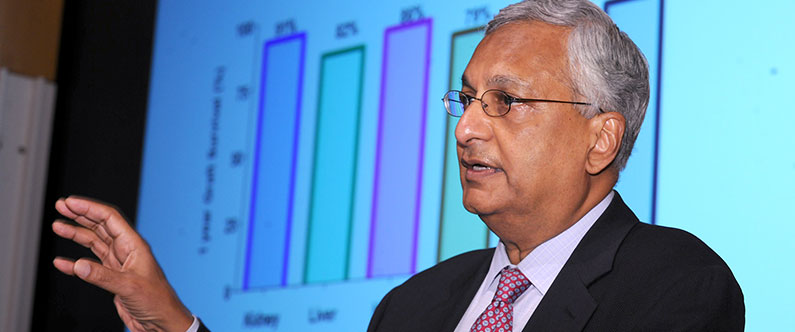Expert explains ‘miracle’ of organ transplants at WCM-Q Grand Rounds
 Dr. Manikkam Suthanthiran said that using organs from animals could be one of the future developments of transplantation medicine.
Dr. Manikkam Suthanthiran said that using organs from animals could be one of the future developments of transplantation medicine.
The past, present and future of organ transplantation was discussed at Weill Cornell Medicine – Qatar’s medical lecture series, the Grand Rounds.
The lecture, entitled The Miracle of Organ Transplantation: Progress and Challenges, was delivered by Dr. Manikkam Suthanthiran, the Stanton Griffis Distinguished Professor of Medicine, chief, Division of Nephrology and Hypertension at Weill Cornell Medicine in New York.
Dr. Suthanthiran, who also holds the role of chief, Department of Transplantation Medicine and Extracorporeal Therapy at NewYork-Presbyterian Hospital, highlighted the difficulties of organ transplantation and how the procedure essentially defies our biology.
“Organ transplantation, without any doubt, is a medical miracle as we are designed evolutionary to distinguish ourselves from others,” he said. “Our whole defense system immediately recognizes the transplanted organ as different from self and tries to damage and destroy it, so to take this organ – even though it is life-saving – and place it in to someone else’s body, well it’s a miracle that it works.”
That it works is partially thanks to Dr. Joseph Murray, a pioneer of organ transplantation who conducted the world’s first kidney transplant in 1954. Nobel Prize winner Dr. Murray was able to bypass the body’s natural immune-response system as the transplant was between two identical twins. The recipient of the kidney went on to live for eight more years.
Although the first transplant was a success, most early attempts failed: in 1963 the survival rate for a kidney transplant was just one in 10, whereas now more than 90 per cent of patients can expect to survive, mainly due to improved immune-suppressive drugs, without which the recipient’s body will attack and destroy the transplanted organ. Dr. Suthanthiran and colleagues including Dr. Karsten Suhre, professor of physiology and biophysics at WCM-Q, are working on the development of noninvasive molecular tests to make transplants safer and treatment highly individualized.
While transplants now enjoy a high success rate, doctors must still battle against organ rejection, infections and a shortage of donor organs. Dr. Suthanthiran, who was speaking at WCM-Q to an audience of physicians, researchers, students and healthcare professionals, said that xenotransplantation, whereby organs from other species are used, is a promising area of research that could potentially relieve the donor shortage.
The Grand Rounds, developed by WCM-Q’s Division of Continuing Professional Development (CPD), provides a platform for expert speakers to engage with healthcare professionals in the community to disseminate knowledge of the latest developments in medical technology, research and best practice.
Dr. Sohaila Cheema, director of global and public health, thanked Dr. Suthanthiran for his lecture.
She said:
“It has been a great honor to hear from one of the world’s leading experts on organ transplantation. The future of transplants is tremendously exciting and offers hope for the hundreds of thousands of people around the world who are in need.
The Grand Rounds is a great vehicle through which we can share new knowledge with the rest of the healthcare community in Qatar and the wider region, for the benefit of healthcare professionals and, ultimately, patients.”